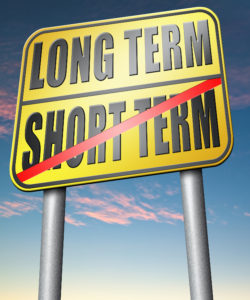While short-term investment decisions can look like the best way to profit in the stock market, we feel that a better strategy by far is to buy top-quality stocks: stocks that will gradually accumulate stock market profits over decades.
And because you’re investing for a long period of time, short market fluctuations will have very little effect on long-term gains. That makes for a less stressful term 30 (not to mention successful) investment strategy.
Short-term investment decisions can lead to premature selling
There is no denying the immediate appeal of taking a fast profit. However, most successful investors find over long periods that much of their profit comes from a handful of their best investments: stocks that went up much more than they ever expected. If you are too quick to take profits, you’ll wind up selling your best picks when they are just beginning to rise.
Even the best short-term investment decisions will cause you to miss out on the benefits of compounding
Compound interest — earning interest on interest — can have an enormous ballooning effect on the value of an investment over the long term, and lift the overall returns on your portfolio.
This compounding principle applies to equity investments like stocks, not just to fixed-return, interest-paying investments like bonds. When you earn a return on past returns (including reinvested dividends), the value of your investment will grow more quickly. Instead of rising at a steady rate, the number of dollars in your portfolio will grow at an accelerating rate.
Additionally, you can’t expect to earn an outsized return on a risky investment in your portfolio indefinitely. Instead, focus on making steady gains over time with mostly conservative, dividend-paying stocks.
Making short-term investment decisions that cause you to miss out on big gains
To succeed as an investor, you need to get used to the idea that short-term declines come along unpredictably. And just as important, you need to be careful that those short-term fluctuations don’t prompt you to make ill-advised short-term investment decisions—decisions like getting out of the market in anticipation of a further decline and then missing out on a big rebound.
Before making short-term investment decisions, remember that the highest long-term returns will come from following our three-part Successful Investor approach
- Invest mainly in well-established, dividend-paying companies;
- Spread your money out across most if not all of the five main economic sectors (Manufacturing & Industry; Resources & Commodities; Consumer; Finance; and Utilities);
- Downplay or avoid stocks in the broker/media limelight.
Bonus tip: Short selling is one of the short-term investment decisions that we think will cost you money
Short selling stocks involves selling borrowed shares in hopes of a drop in price. We advise against this strategy, mainly because of the perennial drawbacks of short selling.
In short selling stock you eventually have to buy back the stock on the market to return it to its owner. If the stock falls in price while you are “short,” you can buy it back at a lower price. You have then made a profit. But if the stock rises in price, you must buy it back at a higher price than you sold it, and you lose money.
Attractive short-selling opportunities do come along from time to time, but it’s a very hard way to make money. That’s because, compared to buyers, shorts face a broad range of disadvantages.
For one, the returns on short selling stocks are upside down: when you sell short, your maximum gain is 100% (if the stock you’ve shorted goes to zero). But your potential losses are limitless. You also have to pay for any dividends declared by stocks in which you have a short position.
For regular stock purchases, the situation is reversed. Gains are virtually unlimited for stock buyers, since there is no limit on how high a stock can rise, regardless of its fundamentals. But the most a buyer can lose is 100%, if the stock goes to zero.
How have you made short-term investing part of your investment strategy, or do you only stick to long-term investments?
What short-term investing decisions have you made that negatively impacted your portfolio?
 Pat McKeough has been one of Canada’s most respected investment advisors for over three decades. He is the founder and senior editor of TSI Network and the founder of Successful Investor Wealth Management. He is also the author of several acclaimed investment books. This article was originally published published in January 2019. It is republished on the Hub with permission.
Pat McKeough has been one of Canada’s most respected investment advisors for over three decades. He is the founder and senior editor of TSI Network and the founder of Successful Investor Wealth Management. He is also the author of several acclaimed investment books. This article was originally published published in January 2019. It is republished on the Hub with permission.


